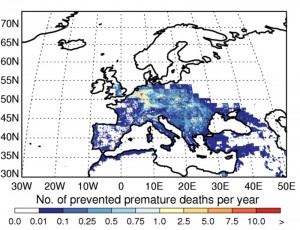Brexit challenge for air quality highlighted

The implications for air quality, human health and regional climate if Britain were to leave the EU have been highlighted in a University of Leeds study, which demonstrates that EU policies and technologies save 80,000 deaths annually.
Published in the journal Environmental Research Letters, it is the first study to look into the effectiveness of specific EU policies to reduce air pollution across Europe. The research reveals that the policies have led to a 35% reduction of fine particles in the atmosphere over the period 1970 to 2010, which has improved public health across Europe.
The implications for a potential 'Brexit' could be significant, said study co-author Dr Dominick Spracklen from the School of Earth & Environment at the University of Leeds: "If the UK were to exit the EU, our air quality policy would no longer be subject to EU legislation, with potential implications for future air quality."
Lead author Steven Turnock, a PhD student at the University’s School of Earth and Environment, emphasised that air pollution is a trans-boundary issue that does not recognise national borders: "The improvements in human health shown in this research have been achieved by European countries acting together."
However, concerns for the future were given an alternative twist in Business Green, which covered the study and pointed to a Bloomberg story suggesting that freetrade laws on air quality in the European Economic Area (which Britain would remain a part of) would still apply, and could even be tightened - without any input from the UK.
Whatever the outcome of the June referendum, the value of regulation to protect people from air pollution has been shown by the Leeds research, which demonstrated a reduction in premature deaths across Europe of around a fifth since 2011.
“Our research highlights the need to maintain and strengthen existing air quality policy in the face of a possible exit from the EU and develop new technologies that will further drive down emissions," said Turnock.
